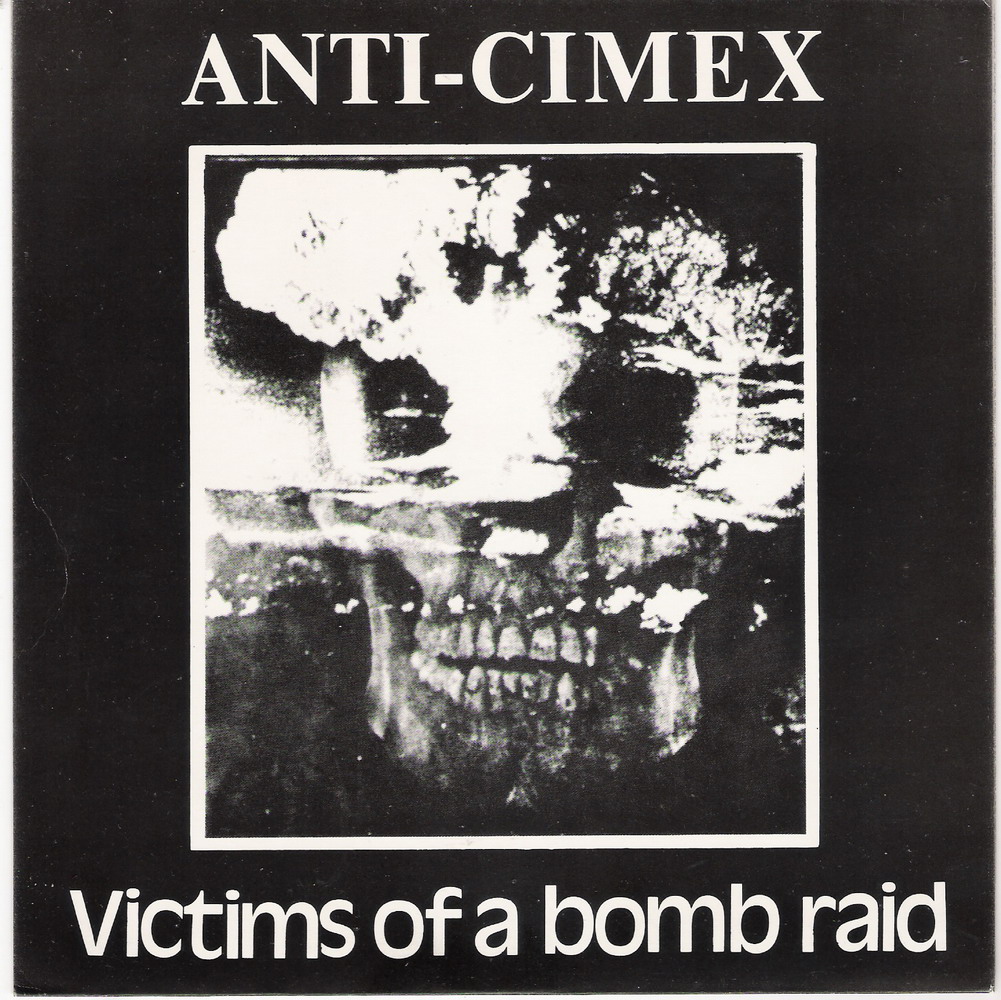What would it look like if metal culture abandoned music? How necessary in fact is music to metal? This might seem absurd, but there are precedents of a sort. Both goth and punk are only partially dependent on music. Music is one element of goth culture, alongside fashion, literature, visual arts and film. Although music is somewhat more central to punk than to goth, even here there’s a strong tradition of political and social activism that is not dependent on sound for its survival.
Without music, what would metal be? Yes there are distinctively metal ways of dressing, but these have become much less central to metal culture in recent decades. Yes metal often draws on particular visual aesthetics, but these seem too inessential to metal to support metal culture on its own. It would certainly be interesting though for metal to move into new artistic formats. Although metal cinema – think Rob Zombie – does not seem particularly promising, there‘s lots of room to experiment. Metal literature, perhaps built on the more adventurous forms of metal criticism, might also be worth exploring. John Darnielle’s Black Sabbath-riffing Master of Reality is a perfect example.
It might be that metal beyond metal, if it can exist at all, might be pursued through more ineffable means than simply transferring metal aesthetics elsewhere. One place to start would be through exploring what metal scene members mean when they call something “metal.” It doesn’t just mean a genre affiliation. It connotes a certain kind of social value, at least when metal fans use the term.
What is this value? It cannot be precisely defined. It refers to something that is hard, intractable and resilient. It refers to something that is defiant, inexhaustible and unashamed. To be metal is to be unafraid to explore darkness and transgression, but to do it in such a way that one retains one’s sense of selfhood. To be metal is to possess a certain ebullient wit and playfulness that those outside metal often mistake for crassness. To be metal is to value fellowship, to commit to supporting and celebrating the bonds between like-minded people. And there are downsides to metal too: to be metal all too often is to be deliberately blind to the workings of power and prejudice.
I don’t know if metalness is unique to metal culture. However, it’s certainly highly distinctive within it. Metalness is embodied in metal music and it will continue to be so into the near future. But we should at least explore the possibility that there are other ways of keeping it alive, and keeping it distinctive.
The Road Ahead
There are no roadmaps available for the route out of the crisis. These are unprecedented times, and it isn’t just metal that needs to grapple with the implications of abundance. There is a tantalising possibility though that if metal survives, it can show the way ahead not just to other music scenes, but communities of all kinds. Metal isn’t unique in owing much of its historical development to scarcity. Scarcity has been an important pillar of all kinds of scenes and art forms. Boundaries and hierarchies are, in whole or in part, dependent on policing and apportioning scarce symbols, objects, and culture.

Metal is a test case in responding to crises of abundance. If metal, which has been affected so profoundly by its availability, can find a way to make itself scarce, again, then so can other scenes and communities. There is good reason to think that it has the capacity to do so. Perhaps more than any other form of popular culture, metal is strongly committed to resilience and endurance. Metal scene members have often faced considerable obstacles in their path and have learned to deal with them.
Metal is also a space in which avant-garde and populist tendencies are more closely engaged with each other than is the case in most music scenes. While the kinds of metal strategies that I am suggesting may look at first sight like experimental – and hence, marginal – projects, there is no reason that they can’t become more commonplace, albeit mainstream, within the metal community.
The concept of ‘metal beyond metal’ carries with it the hope that the resilience embodied in metal can spread outside of the culture. The present time is one in which requires strategies of resilience, if individual and collective distinctiveness is to survive the flood of always-on information. Perhaps metal, emboldened by its endurance, can be the inspiration for a wider response to a crisis that is engulfing us all.
Coda: Suggestions, Exercises and Projects
Five suggestions for metal musicians
- Metal without riffs
The entire history of metal rests on a limited variety of metal riffs. What would happen if metal abandoned riffs? Riffs require repetition to be riffs at all. What would metal be like if it did not repeat, if songs emerged out of a continuous flow rather than being built out of riff-based units? Perhaps riffless metal would not need songs at all, but could flow indefinitely – ‘endless metal’.
A possible model: Noise artists such as Merzbow, who often takes metallic distortion as their starting point, produce music that usually has a chaotic, flow-like structure. Already embraced by big metal labels like Relapse, there’s already a strong identification with musicians working in this tradition.

- Metal without distortion
Guitar distortion is as essential to metal as riffs. While distortion is less central to some metal subgenres (such as lite metal) and metal bands do experiment with acoustic and keyboard-led tracks, it’s still central to metal’s self-definition. What would happen if metal guitars abandoned distortion without taking such routes? In some cases, such as death metal, the results could be intriguing. A related possibility is metal without guitars. Dominik Irtenkauf pointed out Polymorphic Code as one example.
- Metal without metalheads
Metal is made by metalheads, who usually have considerable knowledge of metal music – and the weight of the past looms over them. Of course some bands include members who are less knowledgeable than others. In symphonic metal, for example, it’s occasionally necessary to bring in non-metal guest musicians. However, the more knowledgeable band members tend to have a disproportionate influence on musical direction. What would happen if a metal band consisted entirely of musicians with either no knowledge of metal, or only a very superficial familiarity with it? Perhaps a metal musician could recruit and ‘direct’ such a band, giving them a list of instructions and constraints to work with? How could non-metalheads help to rethink metal’s musical possibilities?
A possible model: In 2013 the Chinese artist Ai Wei Wei collaborated on a metal-inspired album, the Dante-referencing Divine Comedy, with the musician Zuoxiao Zuzhou. Wei Wei’s atonal vocals provide a fascinating outsider’s perspective on the possibilities of metal, as on the song and video “Dumbass.”
- Metal without volume
Metal is meant to be played loud. Metal’s entire musical vocabulary is predicated on the likelihood of their being performed at high volume. What would metal look like if it was designed to be played at lower volumes? Could it reveal and nurture unanticipated subtleties?
- Metal without names
The basic ‘units’ of metal are band/artist and album/recording. What would happen if bands abandoned band names and anything else that would define them as a single unit? While there are bands that hide their members’ identities, anonymity tends to be embraced in favour of a more defined band identity. Total anonymity (which would also require that the band didn’t play live,) where music is released without anything that identifies (or brands) it, is admittedly hard to envisage. However, it opens up the possibility of changing the basic unit of metal from the band and the album to metal itself. What would happen if metal was just metal – an abundance of music that belonged to everyone?
A possible model: ‘folk’ and ‘traditional’ music has often been perpetuated by individuals whose identity is lost in the midst of time. For example, no one knows who first wrote “Green Grow The Rushes O.” This anonymity has meant the song has been transmitted in dozens of variations and embedded itself in the fabric of English-speaking culture.
Five suggestions for metal listeners
- Listen better, listen deeper
Deep knowledge of metal is held in high esteem in the metal world. Knowledge of the breadth of metal can come at the expense of deeper, more intense listening. Although metalheads may listen more deeply and intensely to particular favourite albums, this kind of listening is rarely extended to less favoured recordings. Just as I have committed to listen more deeply to Morgul’s Lost In Shadows Grey, challenging oneself to listen harder to metal that doesn’t immediately excite can pay surprising dividends. Forsaking both repetitive listening to favourite albums, and losing oneself in the sea of metal in favour of better and deeper listening, may open up unexpected aspects of metal.
- The ‘metal fast’
For metalheads, listening to metal is a part of everyday life – and it has never been easier to fill one’s life with metal listening than today. But what would happen if one abandoned metal altogether for a period of time? This could be for as short as Bill Drummond’s No Music Day or as long as weeks, months or even years. The ‘metal fast’, during which one might explore other kinds of music or indeed listen to no music at all, might allow listeners to return to metal afresh and hear new things.
- Abandon recorded music
Bill Drummond’s belief that recorded music has run its course may or not be correct, but it may be useful to abandon recorded metal, at least for a time. This doesn’t have to mean taking part in a (permanent or temporary) metal fast, as metal is still played live. Listening to metal only in a live context may change one’s understanding of metal. Metal usually sounds ‘different’ in concert (particularly extreme metal, which is hard to produce live.) What might metal sound-like as a live-only genre?
- Riff hunting
Most metalheads listen to metal for pleasure, without any particular aim or intention. What would happen if listening became a self-conscious quest for something specific? One way of attempting this could be through “riff hunting,” or searching for particular riffs. Metal uses and re-uses riffs all the time. Identifying and tracking the same riff as it re-appears over time in different songs could create an urgency and sense of purpose to listening – and maybe reveal new pleasures.
- Create your own metal
Why should listeners accept recorded music in the form it is given to them? The song is not sacrosanct and one might enjoy some sections rather than others. The technology now exists for everyone to be able to edit songs to their liking. Riffs, solos and other elements of a song can be cut out and pasted into new compositions. It’s easy to, for example, cut out Ozzy Osbourne’s vocals from Black Sabbath songs if you don’t like them. As punks have often said, Do It Yourself. It’s the essence of creativity.
Part seven in a series. Photographs courtesy of Lola Hierro, Metal Chris, and the Elevate Festival. Published under a Creative Commons license.





